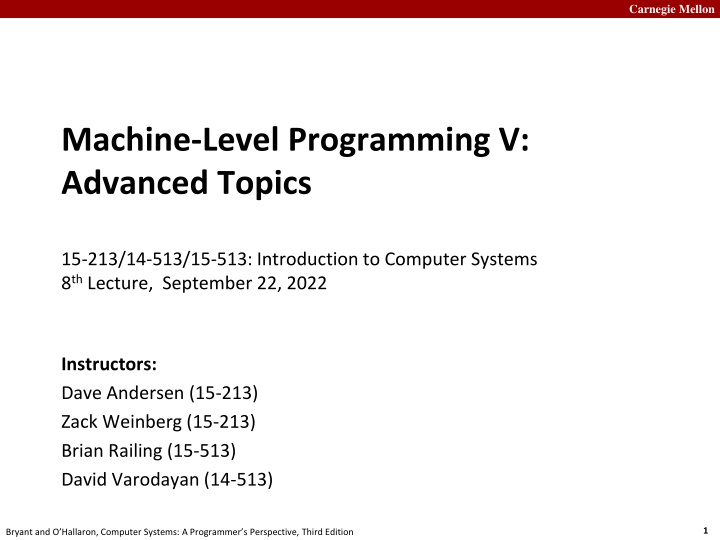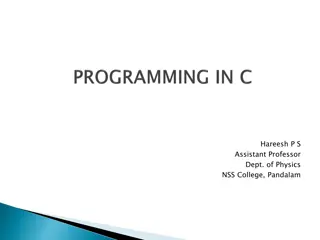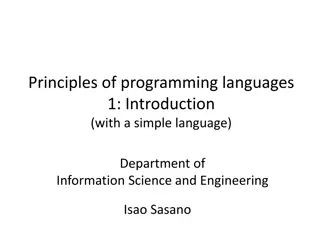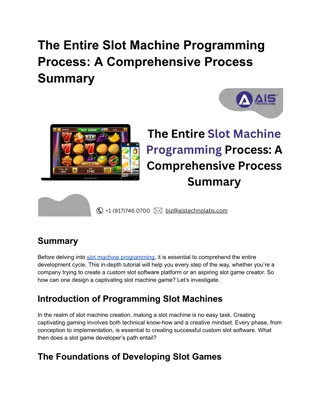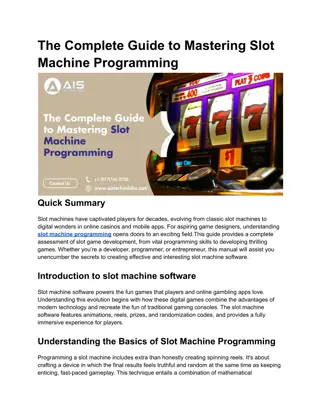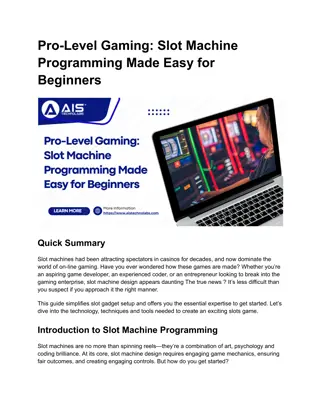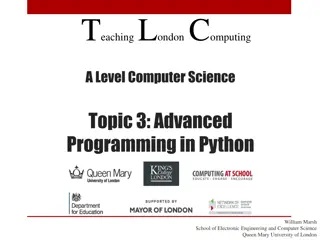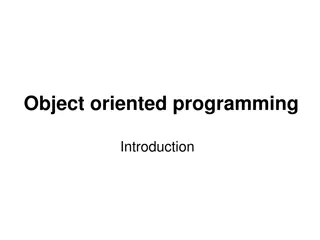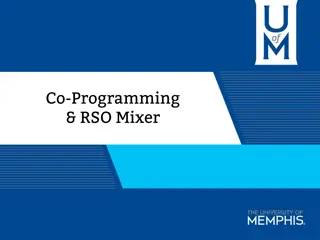Machine-Level Programming V: Advanced Topics
Delve into the intricate world of computer systems with notable instructors discussing memory layout, buffer overflow vulnerabilities, protection mechanisms, and memory allocation examples at Carnegie Mellon University. Explore the x86-64 Linux memory layout, stack and heap allocations, shared libraries, and more in this comprehensive overview.
Download Presentation

Please find below an Image/Link to download the presentation.
The content on the website is provided AS IS for your information and personal use only. It may not be sold, licensed, or shared on other websites without obtaining consent from the author.If you encounter any issues during the download, it is possible that the publisher has removed the file from their server.
You are allowed to download the files provided on this website for personal or commercial use, subject to the condition that they are used lawfully. All files are the property of their respective owners.
The content on the website is provided AS IS for your information and personal use only. It may not be sold, licensed, or shared on other websites without obtaining consent from the author.
E N D
Presentation Transcript
Carnegie Mellon Machine-Level Programming V: Advanced Topics 15-213/14-513/15-513: Introduction to Computer Systems 8thLecture, September 22, 2022 Instructors: Dave Andersen (15-213) Zack Weinberg (15-213) Brian Railing (15-513) David Varodayan (14-513) 1 Bryant and O Hallaron, Computer Systems: A Programmer s Perspective, Third Edition
Carnegie Mellon GCC Bootcamp Compilers and makefiles Sunday September 25 Details to be posted on piazza Zoom link will be posted on piazza Recording and slides will be posted afterwards 2 Bryant and O Hallaron, Computer Systems: A Programmer s Perspective, Third Edition
Carnegie Mellon Today Memory Layout Buffer Overflow Vulnerability Protection Bypassing Protection Unions 3 Bryant and O Hallaron, Computer Systems: A Programmer s Perspective, Third Edition
Carnegie Mellon not drawn to scale x86-64 Linux Memory Layout (247 4096 =) 00007FFFFFFFF000 randomized Stack Runtime stack (8MB limit) e.g., local variables 128 MB Stack 8MB %rsp 00007FFFF8000000 randomized Heap Dynamically allocated as needed When call malloc(), calloc(), new() Shared Libraries Data Statically allocated data e.g., global vars, static vars, string constants Text / Shared Libraries Executable machine instructions Read-only Heap Data Text 400000 1000 Hex Address 0000 4 Bryant and O Hallaron, Computer Systems: A Programmer s Perspective, Third Edition
Carnegie Mellon not drawn to scale Memory Allocation Example 00007FFFFFFFF000 randomized char big_array[1L<<24]; /* 16 MB */ char huge_array[1L<<31]; /* 2 GB */ Stack int global = 0; randomized int useless() { return 0; } Shared Libraries int main () { void *phuge1, *psmall2, *phuge3, *psmall4; int local = 0; phuge1 = malloc(1L << 28); /* 256 MB */ psmall2 = malloc(1L << 8); /* 256 B */ phuge3 = malloc(1L << 32); /* 4 GB */ psmall4 = malloc(1L << 8); /* 256 B */ /* Some print statements ... */ } Heap Data Text 400000 Bryant and O Hallaron, Computer Systems: A Programmer s Perspective, Third Edition Where does everything go? 5
Carnegie Mellon not drawn to scale x86-64 Example Addresses 00007FFFFFFFF000 randomized address range ~247 Stack randomized Shared Libraries and Huge Malloc Blocks local phuge1 phuge3 psmall4 psmall2 big_array huge_array main() useless() 0x00007ffe4d3be87c 0x00007f7262a1e010 0x00007f7162a1d010 0x000000008359d120 0x000000008359d010 0x0000000080601060 0x0000000000601060 0x000000000040060c 0x0000000000400590 Heap (Exact values can vary) Data Text 400000 6 Bryant and O Hallaron, Computer Systems: A Programmer s Perspective, Third Edition
Carnegie Mellon Today Memory Layout https://canvas.cmu.edu/courses/ 30386/assignments/529138 Buffer Overflow Vulnerability Protection Bypassing Protection Do parts 1 and 2 of the activity (getting started, gets()) Unions 8 Bryant and O Hallaron, Computer Systems: A Programmer s Perspective, Third Edition
Carnegie Mellon Recall: Memory Referencing Bug Example typedef struct { int a[2]; double d; } struct_t; double fun(int i) { volatile struct_t s; s.d = 3.14; s.a[i] = 1073741824; /* Possibly out of bounds */ return s.d; } fun(0) -> fun(1) -> fun(2) -> fun(3) -> fun(6) -> fun(8) -> 3.1400000000 3.1400000000 3.1399998665 2.0000006104 Stack smashing detected Segmentation fault Result is system specific 9 Bryant and O Hallaron, Computer Systems: A Programmer s Perspective, Third Edition
Carnegie Mellon Memory Referencing Bug Example typedef struct { int a[2]; double d; } struct_t; fun(0) -> fun(1) -> fun(2) -> fun(3) -> fun(4) -> fun(8) -> 3.1400000000 3.1400000000 3.1399998665 2.0000006104 Segmentation fault 3.1400000000 ??? 8 Explanation: Critical State 7 Critical State 6 Critical State 5 Critical State 4 Location accessed by fun(i) d7 ... d4 3 d3 ... d0 2 struct_t a[1] 1 a[0] 0 10 Bryant and O Hallaron, Computer Systems: A Programmer s Perspective, Third Edition
Carnegie Mellon Such Problems are a BIG Deal Generally called a buffer overflow When exceeding the memory size allocated for an array Why a big deal? It s the #1 technical cause of security vulnerabilities #1 overall cause is social engineering / user ignorance Most common form Unchecked lengths on string inputs Particularly for bounded character arrays on the stack sometimes referred to as stack smashing 11 Bryant and O Hallaron, Computer Systems: A Programmer s Perspective, Third Edition
Carnegie Mellon String Library Code Implementation of Unix function gets() /* Get string from stdin */ char *gets(char *dest) { int c = getchar(); char *p = dest; while (c != EOF && c != '\n') { *p++ = c; c = getchar(); } *p = '\0'; return dest; } No way to specify limit on number of characters to read Similar problems with other library functions strcpy, strcat: Copy strings of arbitrary length scanf, fscanf, sscanf, when given %s conversion specification 12 Bryant and O Hallaron, Computer Systems: A Programmer s Perspective, Third Edition
Carnegie Mellon Vulnerable Buffer Code /* Echo Line */ void echo() { char buf[4]; /* Way too small! */ gets(buf); puts(buf); } BTW, how big is big enough? void call_echo() { echo(); } unix>./bufdemo-nsp Type a string:01234567890123456789012 01234567890123456789012 unix>./bufdemo-nsp Type a string:012345678901234567890123 012345678901234567890123 Segmentation Fault 13 Bryant and O Hallaron, Computer Systems: A Programmer s Perspective, Third Edition
Carnegie Mellon Buffer Overflow Disassembly echo: 000000000040069c <echo>: 40069c: 48 83 ec 18 4006a0: 48 89 e7 4006a3: e8 a5 ff ff ff 4006a8: 48 89 e7 4006ab: e8 50 fe ff ff 4006b0: 48 83 c4 18 4006b4: c3 sub $0x18,%rsp mov %rsp,%rdi callq 40064d <gets> mov %rsp,%rdi callq 400500 <puts@plt> add $0x18,%rsp retq call_echo: 4006b5: 48 83 ec 08 4006b9: b8 00 00 00 00 4006be: e8 d9 ff ff ff 4006c3: 48 83 c4 08 4006c7: c3 sub $0x8,%rsp mov $0x0,%eax callq 40069c <echo> add $0x8,%rsp retq 14 Bryant and O Hallaron, Computer Systems: A Programmer s Perspective, Third Edition
Carnegie Mellon Buffer Overflow Stack Example Before call to gets Stack Frame for call_echo /* Echo Line */ void echo() { char buf[4]; /* Way too small! */ gets(buf); puts(buf); } Return Address (8 bytes) 20 bytes unused [3][2][1][0] buf %rsp echo: subq $0x18, %rsp movq %rsp, %rdi call gets . . . 15 Bryant and O Hallaron, Computer Systems: A Programmer s Perspective, Third Edition
Carnegie Mellon Buffer Overflow Stack Example Before call to gets void echo() { char buf[4]; gets(buf); . . . } echo: subq $0x18, %rsp movq %rsp, %rdi call gets . . . Stack Frame for call_echo 00 00 00 00 Return Address (8 bytes) 00 40 06 c3 call_echo: . . . 4006be: callq 4006cf <echo> 4006c3: add $0x8,%rsp . . . 20 bytes unused [3][2][1][0] buf %rsp 16 Bryant and O Hallaron, Computer Systems: A Programmer s Perspective, Third Edition
Carnegie Mellon Buffer Overflow Stack Example #1 After call to gets void echo() { char buf[4]; gets(buf); . . . } echo: subq $0x18, %rsp movq %rsp, %rdi call gets . . . Stack Frame for call_echo 00 00 00 00 Return Address (8 bytes) 00 40 06 c3 00 32 31 30 call_echo: 39 38 37 36 . . . 4006be: callq 4006cf <echo> 4006c3: add $0x8,%rsp . . . 35 34 33 32 20 bytes unused 31 30 39 38 37 36 35 34 33 32 31 30 buf %rsp unix>./bufdemo-nsp Type a string:01234567890123456789012 01234567890123456789012 01234567890123456789012\0 Overflowed buffer, but did not corrupt state 17 Bryant and O Hallaron, Computer Systems: A Programmer s Perspective, Third Edition
Carnegie Mellon Buffer Overflow Stack Example #2 After call to gets void echo() { char buf[4]; gets(buf); . . . } echo: subq $0x18, %rsp movq %rsp, %rdi call gets . . . Stack Frame for call_echo 00 00 00 00 00 40 06 00 Return Address (8 bytes) 33 32 31 30 call_echo: 39 38 37 36 . . . 4006be: callq 4006cf <echo> 4006c3: add $0x8,%rsp . . . 35 34 33 32 20 bytes unused 31 30 39 38 37 36 35 34 33 32 31 30 buf %rsp unix>./bufdemo-nsp Type a string:012345678901234567890123 012345678901234567890123 Segmentation fault Program returned to 0x0400600, and then crashed. 18 Bryant and O Hallaron, Computer Systems: A Programmer s Perspective, Third Edition
Carnegie Mellon Stack Smashing Attacks void P(){ Q(); ... } A Stack after call to gets() return address Pstack frame int Q() { char buf[64]; gets(buf); ... return ...; } A B A A S data written by gets() pad Q stack frame void S(){ /* Something unexpected */ ... } Overwrite normal return address A with address of some other code S When Q executes ret, will jump to other code 19 Bryant and O Hallaron, Computer Systems: A Programmer s Perspective, Third Edition
Carnegie Mellon Crafting Smashing String int echo() { char buf[4]; gets(buf); ... return ...; } Stack Frame for call_echo 00 00 07 FF FF FF AB 80 00 40 06 c3 00 00 00 00 Return Address (8 bytes) 33 32 31 30 %rsp Target Code void smash() { printf("I've been smashed!\n"); exit(0); } 39 38 37 36 35 34 33 32 20 bytes unused 31 30 39 38 24 bytes 37 36 35 34 33 32 31 30 00000000004006c8 <smash>: 4006c8: 48 83 ec 08 Attack String (Hex) 30 31 32 33 34 35 36 37 38 39 30 31 32 33 34 35 36 37 38 39 30 31 32 33 c8 06 40 00 00 00 00 00 20 Bryant and O Hallaron, Computer Systems: A Programmer s Perspective, Third Edition
Carnegie Mellon Smashing String Effect Stack Frame for call_echo 00 00 07 FF FF FF AB 80 00 40 06 c8 00 00 00 00 Return Address (8 bytes) 33 32 31 30 %rsp Target Code void smash() { printf("I've been smashed!\n"); exit(0); } 39 38 37 36 35 34 33 32 20 bytes unused 31 30 39 38 37 36 35 34 33 32 31 30 00000000004006c8 <smash>: 4006c8: 48 83 ec 08 Attack String (Hex) 30 31 32 33 34 35 36 37 38 39 30 31 32 33 34 35 36 37 38 39 30 31 32 33 c8 06 40 00 00 00 00 00 21 Bryant and O Hallaron, Computer Systems: A Programmer s Perspective, Third Edition
Carnegie Mellon Performing Stack Smash linux> cat smash-hex.txt 30 31 32 33 34 35 36 37 38 39 30 31 32 33 34 35 36 37 38 39 30 31 32 33 c8 06 40 00 00 00 00 00 linux> cat smash-hex.txt | ./hexify | ./bufdemo-nsp Type a string:012345678901234567890123?@ I've been smashed! Put hex sequence in file smash-hex.txt Use hexify program to convert hex digits to characters Some of them are non-printing Provide as input to vulnerable program void smash() { printf("I've been smashed!\n"); exit(0); } 30 31 32 33 34 35 36 37 38 39 30 31 32 33 34 35 36 37 38 39 30 31 32 33 c8 06 40 00 00 00 00 00 22 Bryant and O Hallaron, Computer Systems: A Programmer s Perspective, Third Edition
Carnegie Mellon Code Injection Attacks Stack after call to gets() void P(){ Q(); ... } Pstack frame return address A A B A B int Q() { char buf[64]; gets(buf); ... return ...; } pad data written by gets() Q stack frame exploit code B Input string contains byte representation of executable code Overwrite return address A with address of buffer B When Q executes ret, will jump to exploit code 23 Bryant and O Hallaron, Computer Systems: A Programmer s Perspective, Third Edition
Carnegie Mellon How Does The Attack Code Execute? Stack rip rsp void P(){ Q(); ... } rsp A B A B rsp pad rip ret ret exploit code Shared Libraries int Q() { char buf[64]; gets(buf); // A->B ... return ...; } rip Heap Data rip rip Text 24 Bryant and O Hallaron, Computer Systems: A Programmer s Perspective, Third Edition
Carnegie Mellon Today Memory Layout https://canvas.cmu.edu/courses/ 30386/assignments/529138 Buffer Overflow Vulnerability Protection Bypassing Protection Do parts 3 and 4 now Unions 25 Bryant and O Hallaron, Computer Systems: A Programmer s Perspective, Third Edition
Carnegie Mellon What to Do About Buffer Overflow Attacks Avoid overflow vulnerabilities Employ system-level protections Have compiler use stack canaries Lets talk about each 26 Bryant and O Hallaron, Computer Systems: A Programmer s Perspective, Third Edition
Carnegie Mellon 1. Avoid Overflow Vulnerabilities in Code (!) /* Echo Line */ void echo() { char buf[4]; fgets(buf, 4, stdin); puts(buf); } For example, use library routines that limit string lengths fgets instead of gets strncpy instead of strcpy Don t use scanf with %s conversion specification Use fgets to read the string Or use %nswhere n is a suitable integer 27 Bryant and O Hallaron, Computer Systems: A Programmer s Perspective, Third Edition
Carnegie Mellon 2. System-Level Protections Can Help Stack base Randomized stack offsets At start of program, allocate random amount of space on stack Shifts stack addresses for entire program Makes it difficult for hacker to predict beginning of inserted code e.g., 5 executions of memory allocation code Random allocation main Application Code B? local 0x7ffe4d3be87c 0x7fff75a4f9fc 0x7ffeadb7c80c 0x7ffeaea2fdac 0x7ffcd452017c pad Stack repositioned each time program executes exploit code B? 28 Bryant and O Hallaron, Computer Systems: A Programmer s Perspective, Third Edition
Carnegie Mellon 2. System-Level Protections Can Help Stack after call to gets() Non-executable memory Older x86 CPUs would execute machine code from any readable address x86-64 added a way to mark regions of memory as not executable Immediate crash on jumping into any such region Current Linux and Windows mark the stack this way Pstack frame B pad data written by gets() Q stack frame exploit code B Any attempt to execute this code will fail 29 Bryant and O Hallaron, Computer Systems: A Programmer s Perspective, Third Edition
Carnegie Mellon 3. Stack Canaries Can Help Idea Place special value ( canary ) on stack just beyond buffer Check for corruption before exiting function GCC Implementation -fstack-protector Now the default (disabled earlier) unix>./bufdemo-sp Type a string:0123456 0123456 unix>./bufdemo-sp Type a string:012345678 *** stack smashing detected *** 30 Bryant and O Hallaron, Computer Systems: A Programmer s Perspective, Third Edition
Carnegie Mellon Protected Buffer Disassembly echo: 40072f: 400733: 40073c: 400741: 400743: 400746: 40074b: 40074e: 400753: 400758: 400761: 400763: 400768: 40076c: sub $0x18,%rsp mov %fs:0x28,%rax mov %rax,0x8(%rsp) xor %eax,%eax mov %rsp,%rdi callq 4006e0 <gets> mov %rsp,%rdi callq 400570 <puts@plt> mov 0x8(%rsp),%rax xor %fs:0x28,%rax je 400768 <echo+0x39> callq 400580 <__stack_chk_fail@plt> add $0x18,%rsp retq 31 Bryant and O Hallaron, Computer Systems: A Programmer s Perspective, Third Edition
Carnegie Mellon Setting Up Canary Before call to gets /* Echo Line */ void echo() { char buf[4]; /* Way too small! */ gets(buf); puts(buf); } Stack Frame for call_echo Return Address (8 bytes) 20 bytes unused Canary (8 bytes) [3][2][1][0] buf %rsp echo: . . . mov mov xor . . . %fs:0x28, %rax # Get canary %rax, 0x8(%rsp) # Place on stack %eax, %eax # Erase register 32 Bryant and O Hallaron, Computer Systems: A Programmer s Perspective, Third Edition
Carnegie Mellon Checking Canary After call to gets /* Echo Line */ void echo() { char buf[4]; /* Way too small! */ gets(buf); puts(buf); } Stack Frame for main Return Address (8 bytes) Return Address Saved %ebp Saved %ebx Some systems: LSB of canary is 0x00 Allows input 01234567 20 bytes unused Canary Input: 0123456 Canary (8 bytes) [3][2][1][0] 00 36 35 34 33 32 31 30 buf %rsp echo: . . . mov xor je call 0x8(%rsp),%rax # Retrieve from stack %fs:0x28,%rax # Compare to canary .L6 # If same, OK __stack_chk_fail # FAIL 33 Bryant and O Hallaron, Computer Systems: A Programmer s Perspective, Third Edition
Carnegie Mellon Return-Oriented Programming Attacks Challenge (for hackers) Stack randomization makes it hard to predict buffer location Marking stack non-executable makes it hard to insert binary code Alternative Strategy Use existing code Part of the program or the C library String together fragments to achieve overall desired outcome Does not overcome stack canaries Construct program from gadgets Sequence of instructions ending in ret Encoded by single byte 0xc3 Code positions fixed from run to run Code is executable 34 Bryant and O Hallaron, Computer Systems: A Programmer s Perspective, Third Edition
Carnegie Mellon Gadget Example #1 long ab_plus_c (long a, long b, long c) { return a*b + c; } 00000000004004d0 <ab_plus_c>: 4004d0: 48 0f af fe imul %rsi,%rdi 4004d4: 48 8d 04 17 lea (%rdi,%rdx,1),%rax 4004d8: c3 retq rax Gadget address = 0x4004d4 rdi + rdx Use tail end of existing functions 35 Bryant and O Hallaron, Computer Systems: A Programmer s Perspective, Third Edition
Carnegie Mellon Gadget Example #2 void setval(unsigned *p) { *p = 3347663060u; } Encodes movq %rax, %rdi <setval>: 4004d9: c7 07 d4 48 89 c7 movl 4004df: c3 retq $0xc78948d4,(%rdi) rdi Gadget address = 0x4004dc rax Repurpose byte codes 36 Bryant and O Hallaron, Computer Systems: A Programmer s Perspective, Third Edition
Carnegie Mellon ROP Execution Stack c3 Gadget n code c3 Gadget 2 code %rsp c3 Gadget 1 code Trigger with ret instruction Will start executing Gadget 1 Final ret in each gadget will start next one ret: pop address from stack and jump to that address 37 Bryant and O Hallaron, Computer Systems: A Programmer s Perspective, Third Edition
Carnegie Mellon Crafting an ROP Attack String Stack Frame for call_echo Return Address (8 bytes) 00 40 04 dc Return Address (8 bytes) 33 32 31 30 00 00 00 00 Gadget #1 0x4004d4 rax rdi + rdx 00 00 00 00 00 40 04 d0 d4 %rsp Gadget #2 0x4004dcrdi rax 39 38 37 36 35 34 33 32 Combination rdi rdi + rdx 20 bytes unused 31 30 39 38 37 36 35 34 33 32 31 30 buf Attack String (Hex) 30 31 32 33 34 35 36 37 38 39 30 31 32 33 34 35 36 37 38 39 30 31 32 33 d4 04 40 00 00 00 00 00 dc 04 40 00 00 00 00 00 Multiple gadgets will corrupt stack upwards 38 Bryant and O Hallaron, Computer Systems: A Programmer s Perspective, Third Edition
Carnegie Mellon What Happens When echo Returns? Stack Frame for call_echo Return Address (8 bytes) 00 40 04 dc Return Address (8 bytes) 33 32 31 30 00 00 00 00 Echo executes ret Starts Gadget #1 Gadget #1 executes ret Starts Gadget #2 Gadget #2 executes ret Goes off somewhere ... 1. 00 00 00 00 00 40 04 d4 00 40 04 00 00 00 00 %rsp 2. 39 38 37 36 35 34 33 32 20 bytes unused 31 30 39 38 3. 37 36 35 34 33 32 31 30 buf Multiple gadgets will corrupt stack upwards 39 Bryant and O Hallaron, Computer Systems: A Programmer s Perspective, Third Edition
Carnegie Mellon Today Memory Layout https://canvas.cmu.edu/courses/ 30386/assignments/529138 Buffer Overflow Vulnerability Protection Bypassing Protection Do parts 5 and 6 now Unions 40 Bryant and O Hallaron, Computer Systems: A Programmer s Perspective, Third Edition
Carnegie Mellon Today Memory Layout Buffer Overflow Vulnerability Protection Bypassing Protection Unions 41 Bryant and O Hallaron, Computer Systems: A Programmer s Perspective, Third Edition
Carnegie Mellon Union Allocation Allocate according to largest element Can only use one field at a time union U1 { char c; int i[2]; double v; } *up; c i[0] i[1] v up+0 up+4 up+8 struct S1 { char c; int i[2]; double v; } *sp; c i[0] i[1] v 3 bytes 4 bytes sp+0 sp+4 sp+8 sp+16 sp+24 42 Bryant and O Hallaron, Computer Systems: A Programmer s Perspective, Third Edition
Carnegie Mellon Using Union to Access Bit Patterns typedef union { float f; unsigned u; } bit_float_t; u f 0 4 float bit2float(unsigned u) { bit_float_t arg; arg.u = u; return arg.f; } unsigned float2bit(float f) { bit_float_t arg; arg.f = f; return arg.u; } Same as (float) u ? Same as (unsigned) f ? 43 Bryant and O Hallaron, Computer Systems: A Programmer s Perspective, Third Edition
Carnegie Mellon Using Unions as Sum Types typedef union { float f; unsigned u; } num_t; u f 0 4 typedef struct { bool is_float; num_t val; } value_t; u is_float f 0 4 8 (technically is_float only takes 1 byte and then there s 3 bytes of padding) 44 Bryant and O Hallaron, Computer Systems: A Programmer s Perspective, Third Edition
